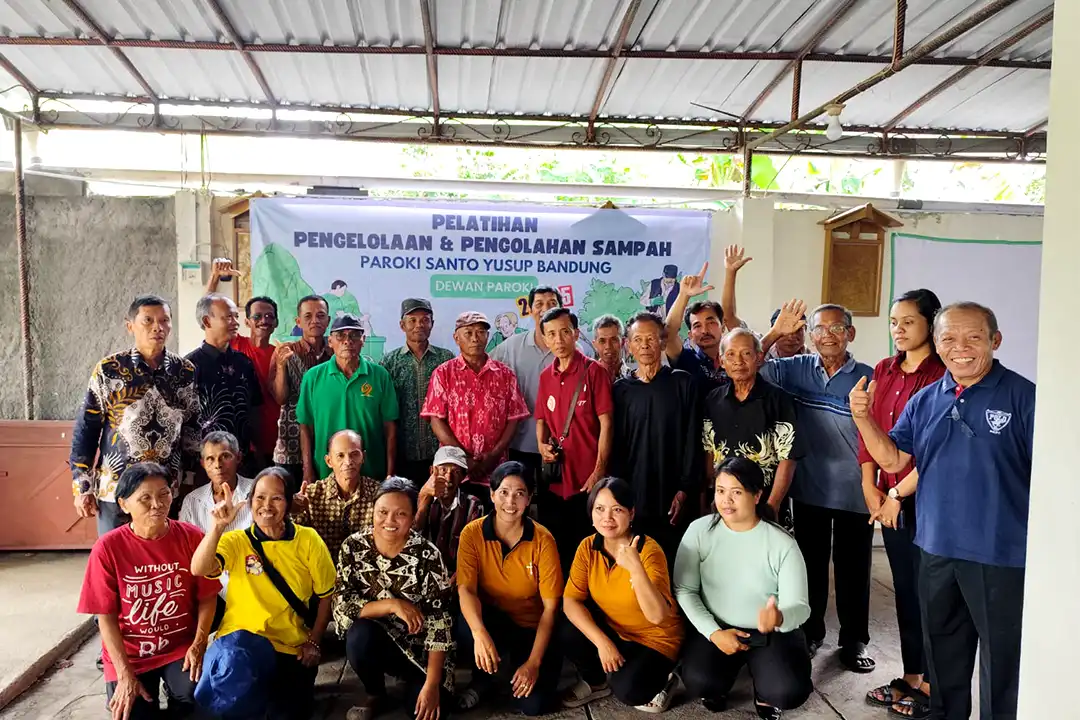A Catholic parish in Indonesia has launched a grassroots environmental program that brings Pope Francis’ Laudato Si’ to life through practical action.
St. Joseph Parish in Bandung initiated the “Go To Green Parish” campaign this year, aiming to promote ecological sustainability and economic empowerment through organic waste processing.
The program, led by the parish’s Social Concerns Ministry in partnership with its environmental team, includes hands-on training in waste management and the production of organic fertilizer.
“This activity is a concrete implementation of Laudato Si’ to realize a green parish,” said Faustinus Sugeng Haryono, head of the parish’s social ministry.
The trainings were rolled out in three areas — Giri Sekar, Bogor, and Beji — between May and June, drawing about 50 participants per session.
The workshops featured environmental educators Henricus Heri Wantoro and Drs. P. Kianto Atmodjo, M.Si., both affiliated with the Laudato Si’ Chapter Yogyakarta and the regional commission for justice, peace, and integrity of creation.
Atmodjo, a lecturer at the Atma Jaya University in Yogyakarta, said the concept of a green parish echoes the Javanese philosophy Hamemayu hayuning bawono dhuk angkoromurko — caring for and enhancing the beauty of the earth.
“This concept aims to ensure that the natural wealth gifted by the Creator can still be enjoyed by future generations,” he said.
Participants were trained to manage waste using various techniques, including maggot composting, losida (kitchen waste pits), composting bags, and stacked pot systems.
“The organic waste decomposition process can take 1–2 months depending on the type of material, starter organisms, and the diligence of the composter,” said Wantoro.
He added that organic waste, when properly processed, can yield marketable products such as maggots, worms, and organic fertilizer.
“Product prices depend on local demand and supply. When synthetic fertilizer is expensive or scarce, the demand is high,” he said.
Atmodjo also introduced methods for producing microbial starters using fruit waste such as pineapple and papaya peels.
Participants were guided in making biocatalyst juice for personal health use, with support from biotechnology students of Atma Jaya University.
One participant described the program as accessible and impactful. “It’s easy to do, the results are guaranteed, and we have full support from the parish’s environmental team,” the participant said.
Program organizer H. Iriyanto said the parish has prepared support facilities and is coordinating follow-up mentoring.
“With continued follow-up, we hope Bandung Parish will become a green parish — a Laudato Si’ parish whose people are grateful for the gift of life from the Creator,” he said.
The initiative also seeks to support the parish’s largely farming community by promoting organic practices that reduce dependence on chemical fertilizers and improve yields.
Organizers said “Go To Green Parish” marks a growing trend among faith communities in Indonesia integrating ecological action into pastoral life, in line with the Church’s call to care for creation.







